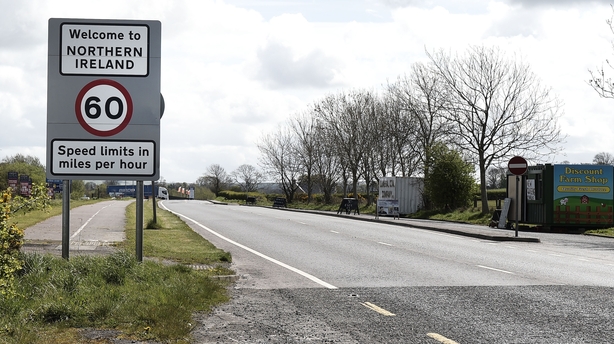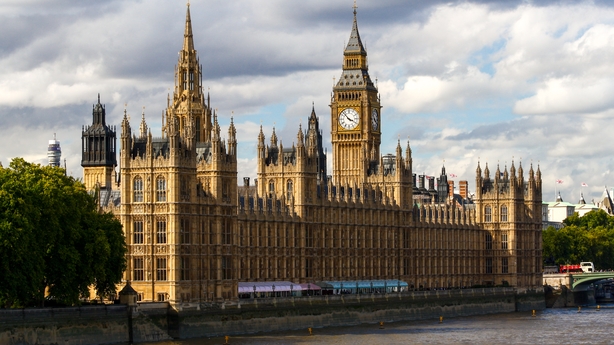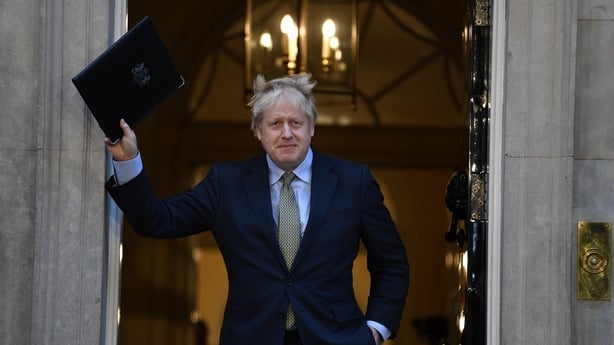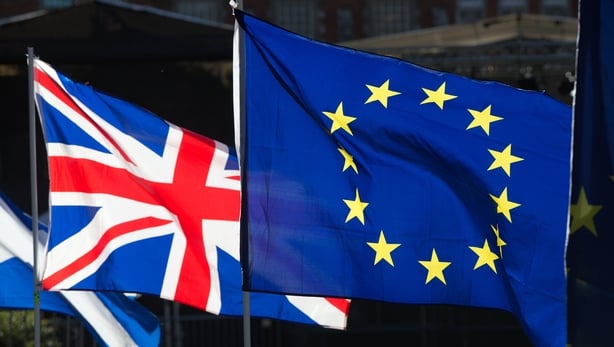A former British diplomat, who was Boris Johnson's Brexit counsellor in Washington, has spoken of her dismay and anger at his administration’s attitude to the Irish border question when he became Prime Minister in July 2019.
Alexandra Hall Hall said a senior member of Mr Johnson’s cabinet told a US think tank audience that the only people worried about the impact on Northern Ireland of a no-deal Brexit, which was a possibility at the end of October 2019, were "a few farmers with turnips in the back of their trucks."
In an interview with RTÉ’s Brexit Republic podcast, Ms Hall Hall said the remarks by the unnamed British minister were "unbelievably offensive" and that they were made by a minister currently serving in Mr Johnson’s cabinet.
Had the UK left the EU without a divorce settlement in October 2019 then the prospects of a hard border on the island of Ireland would have risen considerably.
Ms Hall Hall said the Northern Ireland issue was "really acute" as she attempted to explain to a US audience what London’s policy was.

She said: "The difficulty we had was the reluctance of ministers just to acknowledge that this was an issue at all. The lines we would be given would just say bland things like, we're committed to the Good Friday Agreement. And, of course, we won't allow a hard border on Ireland.
"That only got you so far, because the questioner would come back and say, 'well, how are you going to avoid that?’ And if you go for this form of Brexit, there has to be a border somewhere because you're leaving the single market. So where will the checks be done?"
The former diplomat said trying to reassure the Irish-American caucus in Congress was particularly difficult.
She said that when the House Speaker Nancy Pelosi returned from a trip to London, where she met the eurosceptic European Research Group (ERG) of MPs, she was "really angry" because she had been stonewalled by the group and told that the EU and Ireland were "using" the Irish border "to put pressure on the British".
Ms Hall Hall said that British ministers in Washington were highly selective in who they would speak to.
"They tended to engage with those parts of the US system that were sympathetic to Brexit. And they would not engage with other think tanks or constituencies that were more skeptical.
"So they never really heard it. straight from the horse's mouth, from people who said, 'but are you really going to be able to handle it this way?'"
Ms Hall Hall, a former British ambassador to Georgia, said that when Boris Johnson took over as Prime Minister from Theresa May in July 2019 civil servants and diplomats were being asked to convey dishonest and "deliberately misleading" messages about the impact of Brexit, particularly on Northern Ireland.
As the UK headed towards a potential no-deal exit she wrote to the Foreign Office that "we're being asked to use lines-to-take that are not honest and that are deliberately misleading. And that's a violation of the civil service code."
She said the turning point was when Mr Johnson prorogued the House of Commons in September 2019, intensifying speculation that Britain would leave the EU without a divorce treaty.

At the time the Benn Act meant that the British government was prohibited from such a course of action, but Ms Hall Hall feared that Mr Johnson, who had already unlawfully prorogued parliament, would breach the Benn Act.
"As we built up to the deadline of 31st October, I told the Foreign Office that if the Prime Minister did not adhere to the Benn Act, I would immediately resign," she said.
Ms Hall Hall’s written complaint led to a review in the Foreign Office over the way British diplomats were expected to convey official UK policy to their interlocutors overseas.
However, even though Mr Johnson did adhere to the Benn Act by concluding a treaty with the European Union, including the Northern Ireland Protocol, she said that he would then contradict officially approved lines that diplomats were taking.
"Even then, the lines were still a little bit disingenuous. And they were completely countermanded by what the Prime Minister and his government were saying. So the lines would then say things that were slightly more accurate. But the prime minister would continue to say something completely different," she said.

The former Brexit Counsellor said the British Embassy in Washington had set up an emergency planning cell to prepare for a no-deal exit and that she did not want to leave her colleagues in the lurch at that moment by resigning.
However, she said that she could no longer continue as a British diplomat after the Withdrawal Agreement was concluded and Mr Johnson won a landslide victory in the subsequent general election.
"We had a deal that was concluded with the EU, and then a general election was called. And in a way that lanced the boil, because that provided a way for the British public to have a vote... And I just realized I had had enough. It was an accumulation, and I didn't think anything was going to get better after the election. And so that was the point at which I thought, I've done my best. I've done my bit. But I can't go on with this any longer," she said.
In her resignation letter to Michael Tatham, the acting British ambassador to the US, Ms Hall Hall said her resignation was not due to her being "for or against" Brexit.
She wrote: "As a civil servant, I would not have been able to accept my current job, were I not ready and willing to implement government policy diligently and impartially… I took this position with a sincere commitment, indeed passion, to do my part, to the very best of my abilities, to help achieve a successful outcome on Brexit."
However, she wrote that she had become "increasingly dismayed by the way in which our political leaders have tried to deliver Brexit, with reluctance to address honestly, even with our own citizens, the challenges and trade-offs which Brexit involves; the use of misleading or disingenuous arguments about the implications of the various options before us; and some behaviour towards our institutions which, were it happening in another country, we would almost certainly as diplomats have received instructions to register our concern."
She added: "It makes our job to promote democracy and respect for the rule of law overseas that much harder, if we are not seen to be upholding these core values at home. The UK’s international credibility depends on our reputation for honesty, decency, and common sense.

"It has therefore been highly dispiriting as a diplomat to witness the significant harm which has been done to that reputation, as well as very painful to observe the incredulity of our international friends and partners, who believe, like I do, that a great nation like the United Kingdom can and should do better."
Ms Hall Hall, who served in British embassies in Washington, Bogota, New Delhi, Bangkok and Tbilisi, said the Foreign Office had begged her not to release the letter, which was written on the eve of the December UK general election.
She agreed but decided to share it privately with a small group of Foreign Office colleagues.
However, she said that when the letter leaked within the Foreign Office she was effectively cut off from the institution she had worked for for 33 years.
She said: "The minute that letter leaked [internally], not a single official in London contacted me again. It's not to say I was cut off like a persona non grata. I got a letter from the personnel department that just said, now that you said you wish to resign, here are all the technical details you need to do. There wasn't a ‘thank you for your service.’ It was just an utter dropping and that I just find it extraordinary, because I was not the only person who had these concerns."
Ms Hall Hall has said publicly that she did not vote for Brexit, but that as a civil servant she supported government policy once the referendum had taken place.
She wrote in the Texas National Security Review last week: "I did not personally support Brexit, but I did not think it was an illegal or an immoral policy.
"The decision to leave the European Union was the democratic choice of the British people, who had voted in a legally constituted referendum."
Ms Hall Hall had taken a career break after being British ambassador to Georgia and had worked for the Atlantic Council think tank in Washington.
She had, in fact, approached the Foreign Office in 2018 to point out that Theresa May’s Brexit policy was appearing incoherent to an American audience.
"There was no really systematic effort to engage and explain to US audiences what Brexit was. And all the coverage was just similar to some of the coverage in the UK, it was very lurid and colorful, personality-driven. And there wasn't really a coherent narrative coming from the UK," she said.
On foot of that intervention, she was appointed as Brexit counsellor in Washington and returned to the Foreign Office.
She said that she engaged with the US government and Congress, as well as think tanks, delivering a message that Brexit was a challenging project and that the government of Theresa May was doing its best to fulfill the democratic vote and work out a course of action.
However, when Mr Johnson succeeded Mrs May, she said the tone and approach changed, and this reflected the deepening antagonism within the House of Commons.
"The language of the tone and debates of the House of Commons became much more antagonistic. And MPs were being accused of being traitors or betraying the will of the people.
"And then also the lines to take that were circulated to civil servants just became overtly more political with very loaded language. So the Benn Act was described as the surrender Act.
As a civil servant, we're really not supposed to use that kind of loaded political language," she said.







